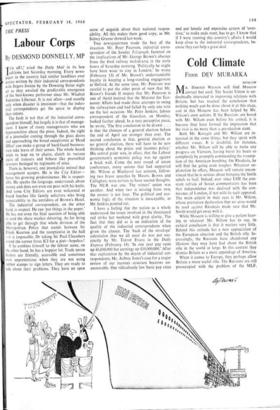Labour Corps
By DESMOND DONNELLY. MP
'TVs off!,' cried the Daily Mail in its late 1 editions last Saturday morning. Every news- paper in the country had similar headlines over stories written by their industrial correspondents with fingers frozen by the Downing Street night air as they awaited the predictable emergence of the best-known performer since Mr. Wladzui Valentino Liberace. It is not often—and usually only when disaster is imminent—that the indus- trial correspondents get the space to display their talents.
The fault is not that of the industrial corre- spondent himself, but largely it is that of manage- ment. I know of many managements who are hypersensitive about the press. Indeed, the sight of a journalist coming through the glass doors and approaching the bored receptionist at 'Head Office' can make a group of hard-faced business- men take leave of their senses. The whole board tends to leap on to chairs, clutch its various pairs of trousers and behave like proverbial spinsters besieged by regiments of mice.
There is, however, one journalistic animal that management accepts. He is the City Editor— hence his growing predominance. He is respect- able. He speaks the language, understands about money and does not even eat peas with his knife. And some City Editors are even welcomed at board lunches like family solicitors who bring respectability to the corridors of Brown's Hotel.
The industrial correspondent, on the other hand, is suspect. He can 'put things in the paper.' He has not even the final sanction of being able to send the share market shivering. As for being able to get through that whole division of the Metropolitan Police that stands between Sir Frank Kearton and the receptionist in the hall —it is impossible. Or taking Sir Paul Chambers round the corner from ICI for a pint—hopeless!
If he confines himself to the labour scene, on the other hand, he has a happier lot. Trade union leaders are friendly, accessible and sometimes even unpretentious when they are not using rubber stamps to sign letters. They are ready to talk about their problems. They have an open
sense of anguish about their national respon- sibility. All this makes them good copy, as Mr. Sidney Greene showed last week.
Two newspapermen made the best of the situation. Mr. Peter Paterson, industrial corre- spondent of the Sunday Telegraph, fastened on the implications of Mr. George Brown's absence from the final railway melodrama in the early hours of Saturday morning. 'Politically he might have been wiser to stay in London,' he wrote (February 13) of Mr. Brown's understandable loyalty in keeping a long-standing engagement at Oxford. At the same time, Mr. Paterson was careful to put the other point of view that Mr. Brown's friends (I suspect that Mr. Paterson is one of them) insisted that the Minister for Eco- nomic Affairs had made three attempts to swing the railwaymen and had failed by only one vote on the last occasion. Mr. Peter Jenkins, labour correspondent of the Guardian, on Monday, looked farther ahead. In a very perceptive piece, he wrote, The first conclusion to be•drawn . . . is that the chances of a general election before the end of April are stronger than ever. The second conclusion is that, general election or no general election, there will have to be new thinking about the prices and incomes policy.' His central point was, in effect, that the Labour government's economic policy was up against a brick wall. Come the next round of union conferences, many unions that had supported Mr. Wilson at Blackpool last autumn, follow- ing two brave speeches by Messrs. Brown and Callaghan, were certain to have second thoughts. The NUR was one. The miners' union was another. And when two is missing from two, the answer is not four. The political and eco- nomic logic of the situation is inescapable, as Mr. Jenkins pointed out.
I have a feeling that the nation as a whole understood the issues involved in the threatened rail strike last weekend with great clarity. The fact that they did so is an indication of the quality of the industrial correspondents when given the chance. The 'back of the envelope' calculation that we all must do was put suc- cinctly by Mr. Trevor Evans in the Daily Express (February 14). 'In one year pay rates up £6,000,000 but earnings up £10,000,000.' After that explanation by the doyen of industrial cor- respondents, Mr. Aubrey Jones's case for a major review of our incomes structure becomes un- answerable. Our ridiculously low basic pay rates and our lunatic and expensive system of 'over- time,' to make ends meet, has to go. I know that if I were running this country's affairs I would keep close to the industrial correspondents, be- cause they can help a great deal.






























 Previous page
Previous page